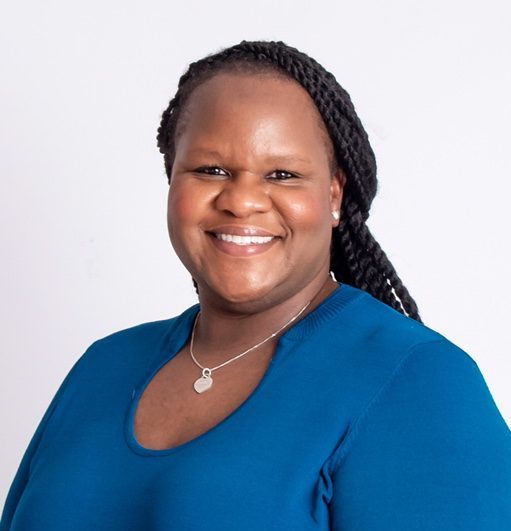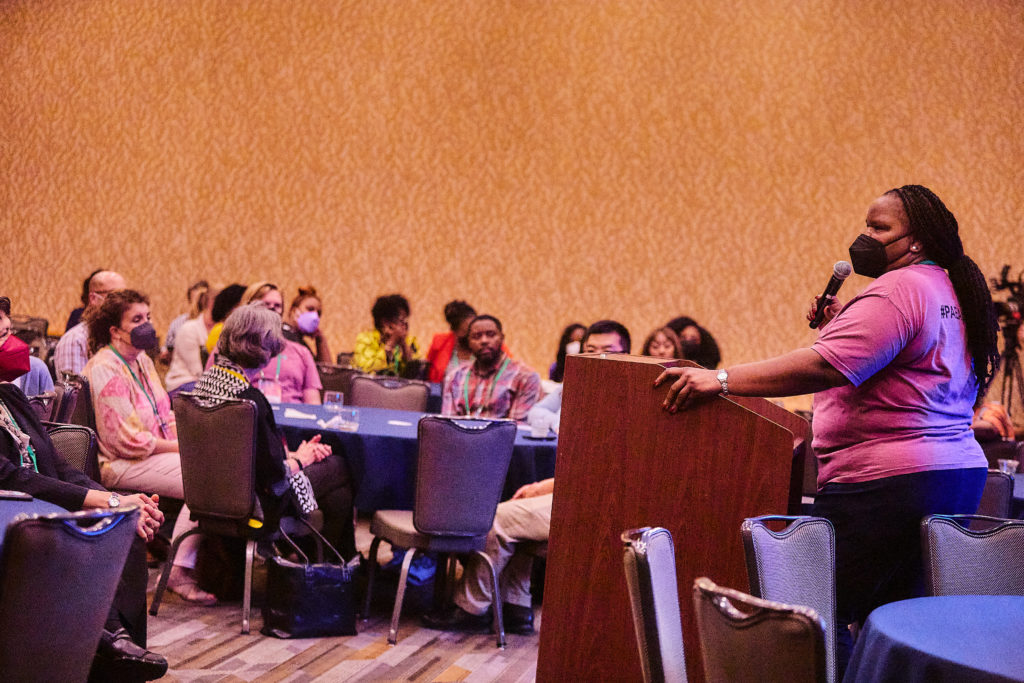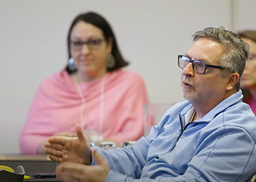New Chief EDI Officer: “Ultimately, This Will Enhance Patient Care”

Emma Sellers, MS, knows she’s taken on a big job as the Chief Equity, Diversity, and Inclusion Officer at PAEA.
Sellers rose to the top in a highly competitive talent search. She joined PAEA in August as the Director of Equity, Diversity, and Inclusion. Her background included working in higher education for more than 15 years with 10 of those years in DEI and a position as the first DEI Coordinator for the City of Concord, North Carolina.
In January, Sellers said in her new role with PAEA, she is “charged with developing a strategic plan that will help PAEA and its members reach diversity accreditation standards and to get close to meeting PAEA’s goal of eliminating systemic racism and bias in PA education.”
“It’s a privilege to be in this position, to be able to be a part of the leadership team of an organization that is progressive, and to be able to develop programming and resources for our member programs whose leaders are working towards increasing diversity and enhancing the overall diversity of the PA profession,” she said. “Ultimately, this will enhance the care that our patients will be able to receive because we will be training people who will reflect the population that they will serve,” she said.
Sellers found a positive way to look at that challenge.
“With 300 accredited PA programs, that’s potentially 300 different opportunities that we may be able to assist,” she said.
The subject, commonly known as DEI but which has more recently been identified as EDI, can mean different things to different people.
“Each one of our programs is extremely diverse, whether they’re public, private, small, big, up North, in the South, rural, urban. Each program is so diverse in their resources, and what they’re able to accomplish, under this diversity umbrella, also varies . … Some programs, when they think about diversity, in addition to thinking about race/ethnic diversity, will also want to consider gender diversity or veteran status and ways to support religious diversity,” she said.
Sellers said her goal is to assist each program that we can in specific, concrete ways.
PAEA’s EDI Team will continue its work to create a “buffet, really, of resources and learning opportunities for programs” and highlight different examples of how the work can be done so that faculty and staff can identify the pieces that are relevant to their programs, she said.

Sellers believes PA educators want to establish a program that is open, inclusive, and welcoming, but she also recognizes there are specific goals to meet.
“The big thing will be providing resources that help each program – completely recognizing the fullness of their diversity – develop a diversity strategic plan or develop diversity goals that not only are specific to their program but also help them meet the diversity accreditation standards,” she said.
Sellers noted there are some assets, like the true support from PAEA and its leadership, that will help with the challenging work.
“It’s very important that you get support from leadership which at PAEA is our board support. EDI work is a part of our strategic plan. The CEO, the leadership team, everyone supports the work of this office and not just in talk but financially, with human resources, with time … Really, just putting the appropriate resources behind this,” she said.
After many years doing DEI work, Sellers knows that not every organization makes a commitment like PAEA has.
“The difference here is there’s true support from the top down and all around, and that does make the work that the EDI team does a bit lighter because it can be a heavy and difficult job to do,” she said.
Even before she became professionally involved, Sellers lived a life that gave her a special look at diversity. Her father was in the military, so she traveled and said she “always knew there was something more than rural South Carolina where I grew up on my family’s farm and a diversity of people and thought existed.”
She has visited about 20 countries and, if things go as planned, will have traveled to every continent by next year.
“What I love about traveling is you get to see that everyone in this world is simply trying to make it, trying to live, trying to have a good life. It looks different for all of us. You have the haves and the have-nots in every place. You have the political issues and systems in every place.. But what it boils down to, we’re all human. We have a different way of doing things and a difference of influences based on culture, but we all want a good life,” she said.
“We want the next generation to have it better, in all aspects of life than we currently do . You know, we all are going toward the same things however, our understanding of the history of people and how that history continues to impact the status of their current lives is not always clearly understood or taken into consideration” Sellers said.
Sellers acknowledged that some view DEI work as a “hot topic” and not everyone recognizes its value and depth but said she believes PAEA sees how this work is necessary for the overall health of the organization, the profession, and the patients.
“This country is changing quickly, and I don’t think that some individuals , some businesses, schools, or organizations realize or accept the pace at which the diversity in this country is changing. As an organization, you have two choices: You become an organization that is inclusive of those that you serve, or you fall behind,” she said.
The results can take time to manifest, but Sellers hopes the people in the PA profession will stay committed for the long haul.
“We are taking the steps necessary to ensure that we are creating spaces where faculty, staff and students are included, that folks are celebrated for who they are and the diversity that they bring, that policies and procedures are established to ensure equity in admissions, recruitment, hiring, retention and promotion, curriculum and the student experience; and hopefully we are creating practitioners who graduate with those same values as well, because have they have developed empathy and understanding for those not like them,” she said.
They may be small steps, but “a series of small steps will ultimately help us undo the systems of injustice, inequity, and racism that have plagued this country for hundreds of years,” Sellers added.




